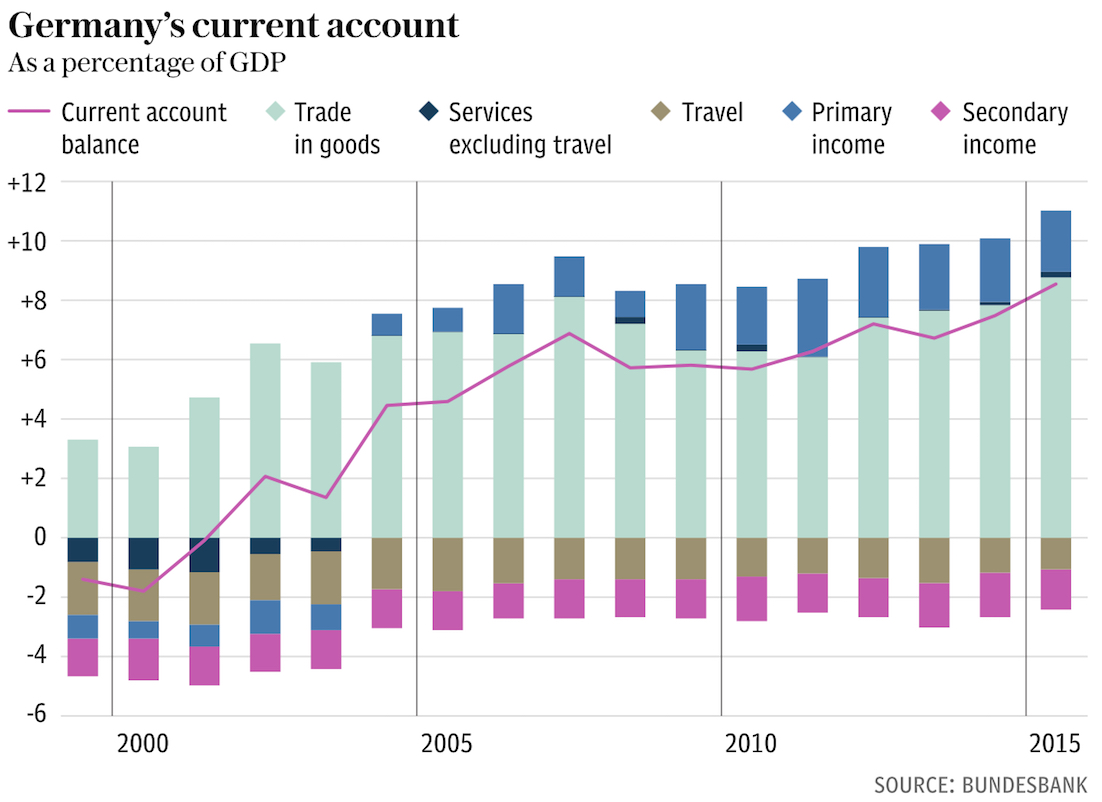Deutschland profitiert von künstlich schwacher Währung
Die Kritik an den deutschen Handelsüberschüssen bewegt die Medien. Meine Meinung dazu ist bekannt und ich habe sie auch nochmals in einem Beitrag für das manager magazin zusammengefasst. Dieser kommt morgen an dieser Stelle.
Kurz zum Erinnern, worum es geht:
Hier der Kommentar von Ambroise Evans-Pritchard im Telegraph. Klar, seine Meinung ist auch bekannt. Wir müssen sie nur zur Kenntnis nehmen, weil sie stark das widerspiegelt, was das Ausland denkt.
- “Germany is the planet’s ultimate currency manipulator. The implicit Deutsche Mark is indeed “grossly undervalued” The warped mechanism of monetary union allows Germany to lock in a permanent ‘beggar-thy-neighbour’ trade advantage over Southern Europe, inflicting mass unemployment on the victim countries and blighting their futures.” – bto: Natürlich liegt es nicht nur am Wechselkurs, dieser spielt aber eine erhebliche Rolle.
- “Germany’s chronic, huge, and illegal current account surplus – 8.8pc of GDP – saps global demand and seriously distorts the world economy.” – bto: Genau das kann sie angesichts der ökonomischen Eiszeit nicht gebrauchen.
- “Once the euro was underway, Germany then pushed through policies in labour law and tax policies that amounted to an ‚internal devaluation‘ – cutting unit labour costs in manufacturing in the single year of 2005 by 4.4pc, for example – and continued to screw down its intra-EMU exchange rate long after there was any justification for doing so. The effect was to further entrench commercial supremacy.” – bto: Die Reformen waren aber erforderlich, weil nur so die Rezession überwunden werden konnte. Mindestens genauso schuld haben die anderen Länder, die einen schuldenfinanzierten Konsumboom erlebten und dabei die Löhne drastisch erhöhten.
- “Large current account surpluses are invariably the result of tax policies, regulations, hidden barriers, and an overall governing structure that punishes consumption and fosters exports. Germany – for example – forces households to cross-subsidize the power costs of export industries.” – bto: Das stimmt, wobei die Stromkosten wegen der Energiewende so hoch sind und immer noch über dem Niveau der anderen Länder; daran liegt es also nicht.
- “We all know why Brussels tolerates Germany’s open breaches of single market rules and competition policy, just as we know why it winked at equally clear violations of EU treaty law on the Gazprom pipeline, and why it fails to do anything about Germany’s violation of the macro-imbalances procedure on current account surpluses.” – bto: We all know? Ich nicht.
- “‚There should at least be some symmetry. Why isn’t Germany being punished. We can’t go on like this, it’s not sustainable‘, said Emma Marcegaglia, the head of the pan-EU industry federation BusinessEurope. ‚Some people say Germany should leave the euro‘, she added acidly, when we spoke in Davos. It is not her view, of course. It is certainly mine.” – bto: Diese Meinung von AEP ist bekannt. Ich finde, sie hat was, ist aber angesichts der deutschen Geschichte undenkbar. Und eine Schuldensozialisierung würde die Probleme auch nicht lösen!
- “The German finance ministry knows exactly what it can do if it wishes to reduce the trade surplus. It can lower the punitively high taxes on low and medium wages, switching the burden to the corporate hoarders of savings that are at the root of the problem.” – bto: Diese Meinung von AEP ist bekannt. Ich finde, sie hat was, ist aber angesichts der deutschen Geschichte undenkbar. Und eine Schuldensozialisierung würde die Probleme auch nicht lösen! Auch der Staat könnte mehr investieren!
- “What is puzzling is that Germany seems to be proud of its surplus, but a big surplus is not a sign of economic vibrancy. It means that German companies cannot find opportunities to invest at home.” – bto: Ja, ich finde es auch immer erstaunlich, wie wir das Kapital so feiern können!
- “Germany has a strategic choice to make. It must either face up to the full implications of monetary union – a fiscal merger, shared debt, a (genuine) banking union, and an internal economic revolution to slash the surplus – or carry out an orderly withdrawal from the euro and revalue so that others can breathe again.” – bto: Doch wo ist der Politiker, der das erklärt?
- “Now we have a White House that deems monetary union to be a German mercantilist tool and a systemic threat to America’s commercial interests. Donald Trump openly desires a break-up of the euro. Does that matter? We will find out.” – bto: Das stimmt und macht es spannend.
bto: Die FT sieht es übrigens etwas differenzierter. Dazu heute Nachmittag mehr.
→ The Telegraph: “Trump is right: Germany is running an illegal currency racket”, 1. Februar 2017








